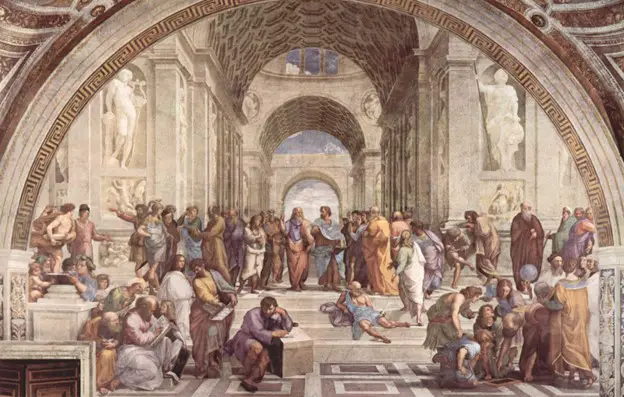|
Getting your Trinity Audio player ready...
|

Plato is the middle child of classic Greek philosophy, sandwiched between his mentor, Socrates, and his student, Aristotle. He lived from approximately 427-347 B.C.E, and resided mostly in Athens, Greece. We are now going to explore what Plato’s beliefs were.
He was an empath, driven by his desire to improve individual and collective lives. And, through many of his theories, he was also one of the first ‘self-help’ authors. This makes many of his theories relevant to life as we know it, years later.
Plato’s lifetime of theories spanned politics, human nature, art and beauty, and so much more. One of the best things about studying the Greeks is pulling out the most relevant ideas. In this post, we cover three deeply intertwined teachings of Plato that are as relevant today as they were in his time.
What were Plato’s Beliefs, and the three things that lead to living a good life?
- Humans are rational beings driven by emotion, and desire.
- Knowledge leads to a fulfilled and morally virtuous life.
- Love, both romantic and platonic, facilitates the growth of virtue.
Plato’s beliefs on human nature
Plato believed that humans are both rational beings, but that we are also driven, at least in part, by our emotions and desires. This is best exemplified by his famous Chariot Allegory, introduced in the dialogue ‘Phaedrus’.
To Plato, desire, and emotion (the horses, for this analogy) are guided by the rational reigns of reason (the cart). And it’s hard to disagree, especially when you’re reigning yourself in from just one more piece of chocolate.

Plato argues that an effective chariot is one where our desires are fueling us with the motivation necessary to move forward, and our reason controls the direction of this energy.
It’s a way of thinking that does not deny our innate emotions and desires, yet still celebrates our ability to reason. Emotions and desires are not only accepted but are utilised as the horsepower behind our actions.
Plato’s conception of human nature seems to resonate with everyone who hears it. I think Plato’s way of understanding humans is accepting and forgiving, and it maintains our accountability. Emotions and desires, just as the cart, are necessary to move us forward.
But as horses, emotions and desires are unwise navigators, and may lead us off our intended path, this is where the cart comes in.
I think the analogy is helpful for slowing down and recognising the direction of our energy and intentions. It can be easy to let desire and emotion lead us off track. Sometimes, it’s alright if they do, as the scenic route is often worth taking.
However, we should make sure we pay attention, and don’t let our horses lead us too far from reason. For a more in-depth account of Plato’s Chariot allegory, this article from The Culturium is a fantastic read.
Plato’s beliefs on human fulfillment
Plato was fixated on using knowledge to support people in living a fulfilled life. Eudaimonia is a Greek word that refers to human flourishing and well-being and is a term that was frequently used in Plato’s work.
For Plato, a fulfilled life is a morally virtuous life. Plato’s four virtues are prudence, justice, fortitude, and temperance. Rather than being fixed traits within people, Plato believed that knowledge is what gives rise to these virtues.
Plato believed that we are fundamentally rational human beings. And, living life in a way that supports and is in alignment with these central virtues, acting ethically, is the key to fulfillment.
It makes sense, therefore, that he argued we should be most at peace when our actions align with reason. Knowledge and experiences give rise to virtue, and virtue is what allows us to make more ethically sound decisions.
That alignment then allows flourishing and a sense of well-being. What a simple formula.
Morality is rarely black and white – right or wrong. It could be argued that it is not as large a piece of the puzzle as Plato believed. However, it is undeniable that our lives are better when we feel our decisions align with our beliefs.
Plato’s beliefs on friendship and love
Plato’s idea of love stems directly from the views on human nature and fulfillment that we mentioned above. It turns out that knowledge is not the only route to virtue.
Plato believed love is characterised by its ability to stimulate virtue in ourselves and others. He also posited that love is necessary for us to see the highest forms of beauty.
He believed love occurs beyond a romantic context, including through friendship. This is where we get the term ‘platonic’ love.

Plato’s conception of love may encourage us to consider the interactions we have with those we love. Taking time to consider love through this lens can act as a reminder to make and take opportunities to support the development of our loved ones. Equally, we should consider how open and willing we are to allow those we love to support our own enlightenment.
If Plato is right, our relationships with our loved ones are crucial to our development, as theirs are to us.
Final Thoughts
Plato’s beliefs on human nature, well-being, and love have stood the test of time. This quote is relevant:
Be careful whose advice you buy, but be patient with those who supply it. Advice is a form of nostalgia. Dispensing it is a way of fishing the past from the disposal, wiping it off, painting over the ugly parts and recycling it for more than it’s worth.
–Mary Schmich, Chicago Tribune, 1997
Each philosopher’s conception of ‘the good life’, human nature, and love, is littered with their own perceptions and experiences, their time in history, culture, and values.
And when we consider the teachings of people who lived over 2,400 years ago, more cleaning and paint may be needed. Though, over time, I have grown to appreciate how little changes.
From Plato’s beliefs on fulfillment, morality, love, beauty, and more, we can work to build a conception of a good life that is a fit for us – and accept that it will not look the same to everyone.

